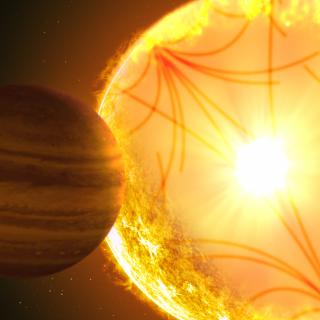Bibcode
Michel, Eric; Baglin, Annie; Auvergne, Michel; Catala, Claude; Samadi, Reza; Baudin, Frédéric; Appourchaux, Thierry; Barban, Caroline; Weiss, Werner W.; Berthomieu, Gabrielle; Boumier, Patrick; Dupret, Marc-Antoine; Garcia, Rafael A.; Fridlund, Malcolm; Garrido, Rafael; Goupil, Marie-Jo; Kjeldsen, Hans; Lebreton, Yveline; Mosser, Benoît; Grotsch-Noels, Arlette; Janot-Pacheco, Eduardo; Provost, Janine; Roxburgh, Ian W.; Thoul, Anne; Toutain, Thierry; Tiphène, Didier; Turck-Chieze, Sylvaine; Vauclair, Sylvie D.; Vauclair, Gérard P.; Aerts, Conny; Alecian, Georges; Ballot, Jérôme; Charpinet, Stéphane; Hubert, Anne-Marie; Lignières, François; Mathias, Philippe; Monteiro, Mario J. P. F. G.; Neiner, Coralie; Poretti, Ennio; Renan de Medeiros, José; Ribas, Ignasi; Rieutord, Michel L.; Roca Cortés, T.; Zwintz, Konstanze
Bibliographical reference
Science, Volume 322, Issue 5901, pp. 558- (2008).
Advertised on:
10
2008
Journal
Citations
244
Refereed citations
191
Description
Oscillations of the Sun have been used to understand its interior
structure. The extension of similar studies to more distant stars has
raised many difficulties despite the strong efforts of the international
community over the past decades. The CoRoT (Convection Rotation and
Planetary Transits) satellite, launched in December 2006, has now
measured oscillations and the stellar granulation signature in three
main sequence stars that are noticeably hotter than the sun. The
oscillation amplitudes are about 1.5 times as large as those in the Sun;
the stellar granulation is up to three times as high. The stellar
amplitudes are about 25% below the theoretic values, providing a
measurement of the nonadiabaticity of the process ruling the
oscillations in the outer layers of the stars.
Related projects

Helio and Astero-Seismology and Exoplanets Search
The principal objectives of this project are: 1) to study the structure and dynamics of the solar interior, 2) to extend this study to other stars (either single or in binary systems), 3) to search for extrasolar planets using photometric methods (primarily by transits of their host stars) and their characterization with complementary radial
Savita
Mathur